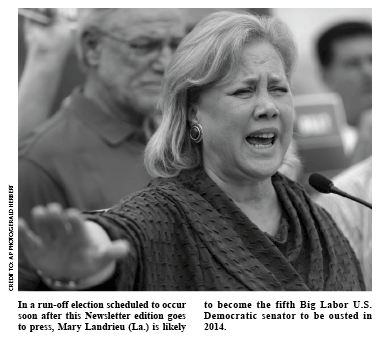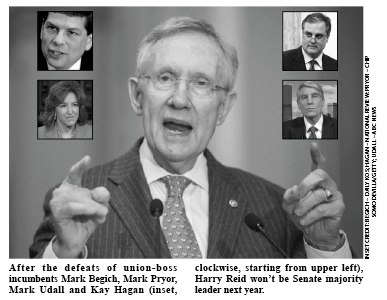Is This Any Way to Run a City’s Schools?
Leaked CTU Proposals Won’t Do Anything to Improve Schools’ Poor Performance
But Big Labor Retains Control Over White House, Federal Agencies
(Source: November-December 2014 National Right to Work Committee Newsletter)
 On November 4, voters in every region of the country sent two clear messages to Big Labor politicians on Capitol Hill: They are dismayed by what the politicians have done at union lobbyists’ behest, and determined to stop them from doing more of the same.
On November 4, voters in every region of the country sent two clear messages to Big Labor politicians on Capitol Hill: They are dismayed by what the politicians have done at union lobbyists’ behest, and determined to stop them from doing more of the same.
In the U.S. Senate, union-label incumbents Mark Begich (D-Alaska), Kay Hagan (D-N.C.), Mark Pryor (D-Ark.), and Mark Udall (D-Colo.) were all defeated, and in three of four cases by unabashedly pro-Right to Work challengers.
Yet another Big Labor senator, Louisiana Democrat Mary Landrieu, now trails 100% pro-Right to Work challenger Bill Cassidy in a run-off election scheduled to take place soon after this Newsletter edition goes to press.
Right to Work advocates also picked up open Senate seats previously held by forced-unionism militants in Iowa, Montana, and South Dakota. And Right to Work gained a net total of 12 U.S. House seats located in districts stretching from Maine to Nevada.
After Backing Big Labor Schemes to Corral Workers Into Unions, Senators Were Defeated
 Why were Americans who went to the polls this year so angry with union-label politicians? It appears clear that, just as they were key sources of voters’ displeasure when they shellacked Big Labor candidates in the 2010 elections, the so-called “Affordable Care Act” (ACA) of 2010, otherwise known as ObamaCare, and “card check” forced unionism were again major objects of public ire in 2014.
Why were Americans who went to the polls this year so angry with union-label politicians? It appears clear that, just as they were key sources of voters’ displeasure when they shellacked Big Labor candidates in the 2010 elections, the so-called “Affordable Care Act” (ACA) of 2010, otherwise known as ObamaCare, and “card check” forced unionism were again major objects of public ire in 2014.
More even than President Obama or any other elected official, top union bosses and their arm-twisting union lobbyists are responsible for Congress’s narrow votes to reconstruct America’s enormous health-care system in late 2009 and early 2010.
In the fall of 2010 and again this year, voters punished vulnerable senators and representatives for doing what Big Labor had told them to do.
(In the presidential election year of 2012, the union bosses’ $1.7 billion, forced dues-fueled campaign mobilization was able to get the Obama-Biden ticket reelected, but support for Right to Work actually increased in both chambers of Congress.)
American voters were also undoubtedly angry with union-label incumbents for having backed compulsory dues and Big Labor power grabs specifically aimed at making it easier for union officials to secure monopoly-bargaining privileges over employees.
Voters in Forced-Unionism States Show They Also Oppose Big Labor Monopolies
Mr. Pryor, for example, had voted in 2007 for the “Card Check” Unionization Bill that would have virtually eliminated secret-ballot voting for union certification and handed Big Labor a huge new weapon to force workers into unions.
In 2009, Mr. Begich, Ms. Hagan, Mr. Pryor, and Mr. Udall all voted to kill a national Right to Work amendment sponsored by then-Sen. Jim DeMint (R-S.C.), and thus forced hardworking Americans to continue paying union dues or fees just to get a job or keep their job.
And in 2012, Mr. Begich, Ms. Hagan, Mr. Pryor, and Mr. Udall joined with 50 other senators in voting to give the Obama National Labor Relations Board (NLRB) a green light to rewrite longstanding rules for how Big Labor acquires monopoly-bargaining control over workers. The barely disguised aim of this rewrite was to make it far easier for union organizers to accomplish that objective.
Most of the 2014 Senate and House races in which candidates vowing full support for the Right to Work captured seats that had been held by union-boss lackeys occurred in states that already have on the books laws prohibiting compulsory union dues and fees.
However, when given a clear choice between a forced-unionism apologist and a supporter of the individual employee’s freedom, voters in the currently non-Right to Work state of Colorado’s Senate race opted against their Big Labor incumbent.
Right to Work advocates also captured House seats that have been held up to now by Big Labor politicians in non-Right to Work Maine, New Hampshire, Wisconsin, and West Virginia.
“For years, polls have shown that citizens in every U.S. region, and not just in states that already bar the firing of employees for refusal to join or pay dues to an unwanted union, overwhelmingly agree that unionism should be voluntary,” said National Right to Work Committee President Mark Mix.
“The November 4 election results in state after state simply reconfirmed what scientific surveys have said all along.”
President Likely to Keep Ignoring Election Returns
After a pro-Right to Work voter backlash wiped out his Democratic Party’s House majority in 2010, and after Big Labor’s machine fell far short of reinstating union-label Democrat Nancy Pelosi (Calif.) as House speaker in 2012, President Barack Obama didn’t even briefly back away from his forced-unionism agenda.
And seasoned political observers do not expect the Democrats’ loss of the Senate and their House caucus’ apparently shrinking to a lower level than any seen since the 1929-30 Congress to sway the President from his chosen course.
During his first six years in office, Mr. Obama repeatedly expressed virulent opposition to Right to Work laws and tried to get the “Card Check” Unionization Bill passed.
After that measure failed due to intense and vigilant opposition by Committee members and their allies, the Obama Administration backed bureaucratic proposals designed to shove millions of additional workers into forced-unionism arrangements.

Leaked CTU Proposals Won’t Do Anything to Improve Schools’ Poor Performance

Wherever Big Labor wields the power to collect forced union dues, union bosses funnel a large share of the confiscated money into efforts to elect and reelect business-bashing politicians. Employment growth tends to lag as a consequence.

Members Insist They Keep Pro-Right to Work Campaign Promises